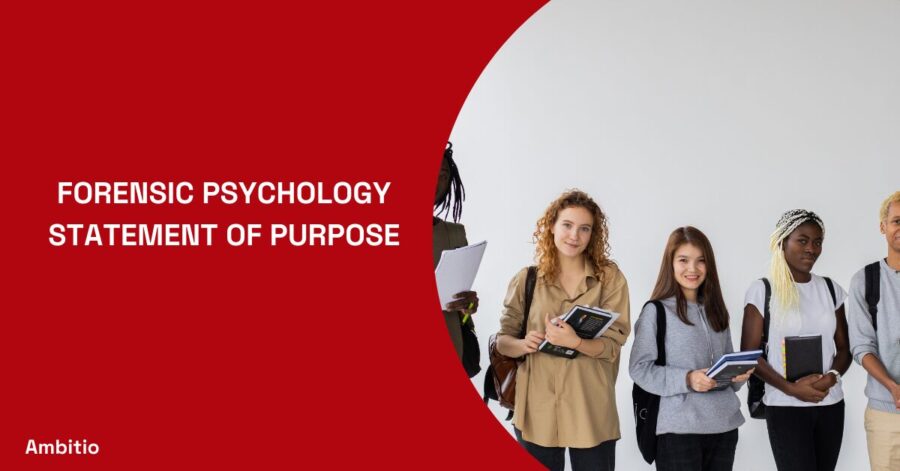13 December 2024
5 minutes read
Mastering Your Forensic Psychology Personal Statement: A Comprehensive Guide

Forensic Psychology Personal Statement: The Key to Unlocking Your Career
Embarking on a career in forensic psychology starts with the creation of a powerful personal statement. This document is not just a formality; it’s a critical part of your application that showcases your passion, qualifications, and uniqueness.
Whether you’re applying for a bachelor’s or a master’s program in forensic psychology, crafting an impactful personal statement can significantly influence your career trajectory.
Understanding the Essence of a Forensic Psychology Personal Statement
Personal statement importance
A forensic psychology personal statement is more than just an academic summary. It is a narrative that intertwines your personal journey with your professional aspirations.
This statement should capture your deep-rooted interest in psychology, your understanding of criminology, and your eagerness to engage with the criminal justice system. It’s your opportunity to demonstrate how your experiences, both academic and personal, have prepared you for a career as a forensic psychologist.
Content considerations
When writing your personal statement, focus on specific experiences that have shaped your understanding and passion for forensic psychology. Discuss courses that have had a significant impact on you, like criminal psychology or clinical psychology.
Reflect on any research projects, internships, or volunteer work that have provided you with valuable insights into human behavior and the workings of the legal system.
Your statement should also highlight your problem-solving skills, your ability to analyze complex situations, and your commitment to understanding the criminal mind.
Crafting a Compelling Narrative: Personal Statement Examples
Utilizing examples
Analyzing forensic psychology personal statement examples can be extremely beneficial. These examples serve as blueprints, showing you how to effectively structure your narrative and what key elements to include. Notice how successful statements balance academic achievements with personal experiences, demonstrating a well-rounded profile.
Personal anecdotes
Your personal experiences are what make your statement unique. Share stories that sparked your interest in forensic psychology. Perhaps you were inspired by a particular event, a book, or a lecture that opened your eyes to the complexities of the criminal mind. Use these anecdotes to convey your passion for the field and to illustrate how your interest has evolved over time.
Merging Criminology and Psychology in Your Forensic Psychology Statement
Interdisciplinary focus
Forensic psychology sits at the intersection of psychology and criminology. Your statement should reflect a thorough understanding of both disciplines. Discuss how psychological theories apply to criminal behavior, how mental health issues intersect with the legal system, and how your studies have prepared you for the multifaceted challenges of this field.
Relevant coursework and experiences
Elaborate on any courses related to criminology and psychology that you have taken. Highlight any practical experiences, such as internships with law enforcement agencies or volunteer work in correctional facilities, that have given you firsthand insights into the field. Explain how these experiences have solidified your decision to pursue a career in forensic psychology.
Tailoring Your Statement for a Forensic Psychology Masters Program
When applying for a master’s program in forensic psychology, your personal statement needs to demonstrate a higher level of academic and professional understanding compared to undergraduate applications.
This is your opportunity to showcase not just your passion and interest in the field, but also your readiness for advanced study and research. Here are some key areas to focus on:
1. Advanced Academic Foundation:
- Highlight Undergraduate Achievements: Discuss your undergraduate coursework, especially any advanced or specialized classes in psychology, criminology, or related fields. Mention how these courses have laid a solid foundation for your postgraduate studies.
- Research Projects: If you’ve participated in any research projects, particularly those related to forensic psychology, describe your role and what you learned. This could include literature reviews, data collection, analysis, or presenting findings at conferences or seminars.
- Thesis or Capstone Projects: If your undergraduate program included a thesis or capstone project, briefly outline your topic, your research methodology, and your conclusions. Explain how this project has prepared you for more advanced research in a master’s program.
2. Professional Exposure and Experience:
- Internships and Work Experience: Detail any relevant internships or work experiences, especially those in settings such as legal departments, correctional facilities, law enforcement agencies, or mental health institutions. Describe your responsibilities and any insights or skills you gained.
- Volunteering and Community Involvement: If you have volunteered in roles relevant to forensic psychology, such as aiding at-risk populations or working with justice-involved individuals, discuss these experiences. Highlight how they have enhanced your understanding of the field.
3. Academic and Career Objectives:
- Master’s Degree Goals: Clearly articulate why you are pursuing a master’s in forensic psychology. Link your academic interests with potential thesis topics or areas of specialization you wish to explore.
- Career Aspirations: Discuss your long-term career goals. Whether you aim to work in criminal profiling, provide expert witness testimony, or engage in policy development, explain how a master’s degree will facilitate these ambitions.
4. Personal Development and Skills:
- Critical Thinking and Analysis: Emphasize skills such as critical thinking and analytical abilities. Provide examples of how you have applied these skills in academic or professional settings.
- Communication Skills: Highlight your communication skills, both written and oral. Master’s programs often require presentations and extensive writing; show that you are prepared for this aspect of the program.
- Ethical Understanding: Forensic psychology often deals with sensitive issues. Discuss your understanding of ethical considerations in research and practice.
5. Alignment with the Program’s Offerings:
- Research Interests and Faculty Alignment: If there are specific faculty members whose research interests align with yours, mention them. Explain why their work excites you and how you could contribute to their research.
- Program-Specific Features: Identify unique features of the master’s program you’re applying to, such as specific courses, training opportunities, or the program’s philosophy. Explain how these aspects align with your academic and career goals.
6. Reflection and Personal Growth:
- Challenges and Learnings: Reflect on any challenges you’ve faced during your academic journey and how they’ve prepared you for graduate studies. This could include balancing work and study, overcoming academic hurdles, or personal growth experiences.
7. Conclusion:
- Reiterate Your Passion and Preparedness: In your concluding paragraphs, reassert your passion for forensic psychology and your preparedness for the challenges of a master’s program. Emphasize your commitment to contributing to the field and advancing your understanding and skills through graduate studies.
The Role of a Forensic Psychologist: Articulating Your Understanding and Aspirations
Understanding the role
It’s crucial to demonstrate an understanding of what a forensic psychologist does. Discuss the various roles, such as providing expert testimony in court, working with law enforcement agencies, or participating in criminal profiling. Show that you understand both the challenges and the responsibilities that come with this career.
Personal Alignment
Explain why you are drawn to these roles and how your skills, experiences, and personal qualities align with the demands of the profession. Perhaps your ability to remain unbiased, your excellent communication skills, or your keen interest in human behavior make you a good fit for this career. Use specific examples to illustrate these points.
Highlighting Your Unique Journey: Personal Experiences and Motivations
Sharing your story
Your unique experiences and personal motivations are what set you apart from other applicants. Share stories that demonstrate your long-standing interest in forensic psychology. Maybe you have a personal connection to the field, or maybe you’ve overcome challenges that have strengthened your commitment to pursuing this career.
Connecting personal and professional
It’s important to connect your personal journey to your professional aspirations. Show how your experiences have shaped not only your interest in forensic psychology but also your suitability for a career in this field. Discuss any relevant skills or qualities you’ve developed as a result of your experiences, such as empathy, resilience, or critical thinking.
FAQs
What should I include in my forensic psychology personal statement?
Focus on your interest in psychology and criminology, understanding of the role of a forensic psychologist, relevant experiences, and career aspirations.
How long should my personal statement be?
Aim for 500-1000 words, but always adhere to the specific guidelines of the program you’re applying to.
Can I include personal experiences in my statement?
Yes, personal experiences that have shaped your interest in forensic psychology are valuable.
How important is my personal statement in the application process?
It’s crucial as it’s your chance to showcase your uniqueness beyond grades and test scores.
Should I mention specific psychology courses in my statement?
Yes, mentioning specific relevant courses can highlight your academic preparedness for the program.

You can study at top universities worldwide!
Get expert tips and tricks to get into top universities with a free expert session.
Book Your Free 30-Minute Session Now! Book a call now




























